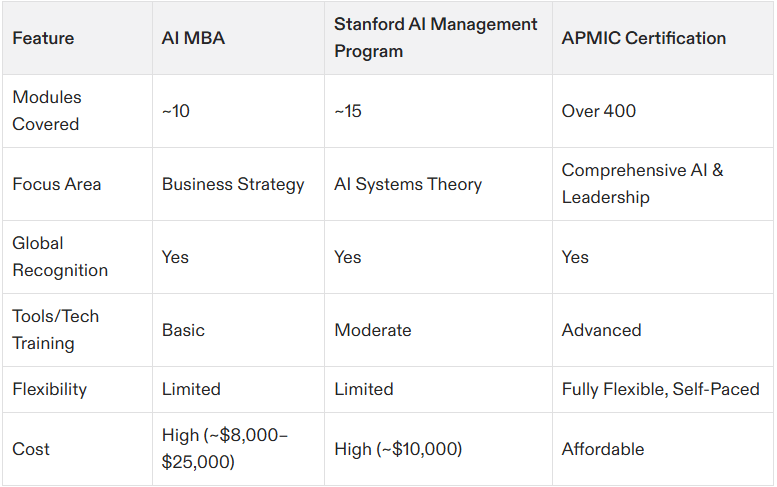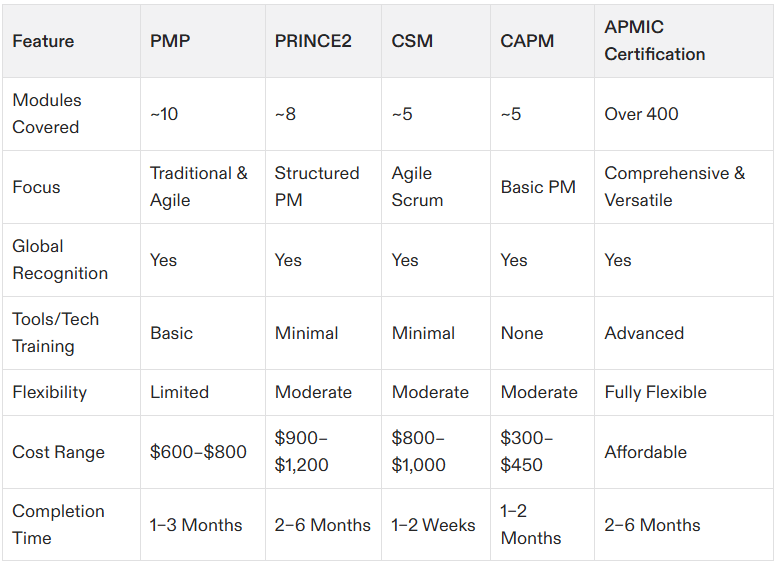Table of Contents
- Introduction – Is DevOps the Superpower You Need?
- What is a DevOps Project Management Certification?
- Why is a DevOps Project Management Certification Important in 2025?
- Top DevOps Project Management Certifications in 2025
- DevOps Project Management vs. Traditional Project Management
- Common Mistakes When Preparing for a DevOps Certification
- Real-World Applications of DevOps Project Management
- 10 Lesser-Known Facts About DevOps Project Management Certification
- The Future of DevOps Project Management – Trends to Watch
- Final Thoughts – Should You Get a DevOps Project Management Certification?
- People Also Ask (PAA) – Answering Common Questions
Introduction – Is DevOps the Superpower You Need?
Ever felt like you're managing pure chaos at work—where developers and operations teams don’t seem to speak the same language? If your daily tasks involve putting out fires, fixing deployment bottlenecks, and aligning IT goals with business objectives, then a DevOps Project Management Certification might just be your superhero cape.
In 2025, DevOps isn’t a trend—it’s the future of IT management. The demand for DevOps project managers has skyrocketed, with organizations seeking experts who can bridge the gap between development and operations, optimize workflows, and ensure seamless project execution.
This guide will walk you through everything you need to know about earning a DevOps Project Management Certification, including costs, career benefits, skills, job opportunities, and expert insights. We’ll also compare certifications and provide proven strategies to ace your exam and land high-paying roles in the DevOps world.
Let’s dive in! 🚀
What is a DevOps Project Management Certification?
A DevOps Project Management Certification is a globally recognized credential that validates your expertise in:
✅ Agile & DevOps methodologies – Combining lean principles with automation and continuous integration.
✅ CI/CD pipeline management – Managing Continuous Integration/Continuous Deployment workflows effectively.
✅ Infrastructure as Code (IaC) – Using tools like Terraform, Ansible, and Kubernetes.
✅ Project management in DevOps – Applying Agile, Scrum, and Kanban methodologies to IT projects.
✅ Cross-team collaboration – Ensuring seamless communication between developers, operations, and security teams.
By earning this certification, you prove your ability to manage DevOps processes efficiently, making you a top candidate for high-paying roles in IT, cloud computing, and enterprise automation. Download the DevOps Roadmap – A free, structured guide to mastering DevOps skills and career growth.
Why is a DevOps Project Management Certification Important in 2025?
With 80% of enterprises adopting DevOps practices (Source: Gartner), professionals who can manage DevOps projects efficiently are more valuable than ever. Companies need leaders who can streamline IT operations, reduce downtime, and ensure smooth deployments. Here’s why getting certified is a game-changer:
1. High Demand, High Salaries
The average salary for a DevOps project manager in the U.S. is $140,000+ per year.
Global DevOps adoption has created millions of job openings worldwide.
2. Bridge the DevOps Gap
DevOps thrives on collaboration. Certified professionals act as connectors between IT and business teams.
Companies want leaders who understand both code and business strategy.
3. Career Growth & Job Security
DevOps reduces IT failures by 50%, making businesses reliant on skilled DevOps professionals.
Certified DevOps managers are promoted 30% faster than non-certified peers.
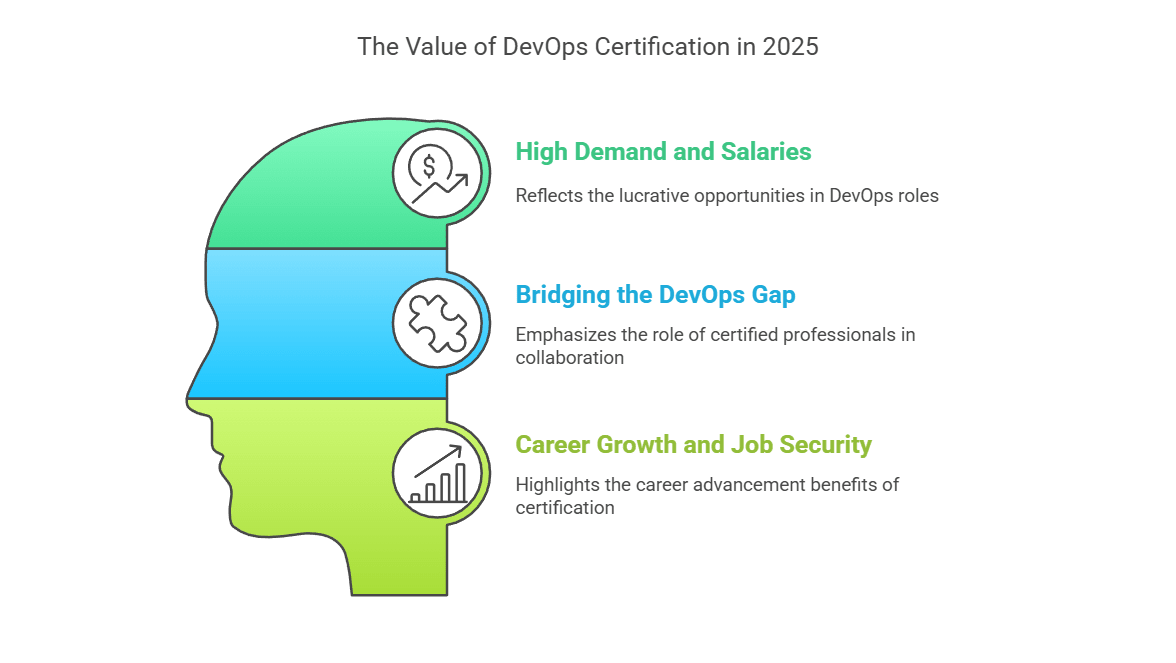
Fact: 70% of IT companies prioritize hiring DevOps-certified professionals over those without certification. (Source: Forbes Tech).
Try a Free CI/CD Pipeline Tool – Get hands-on experience with continuous integration and deployment automation.
Top DevOps Project Management Certifications in 2025
Not all certifications are created equal. Here are the best DevOps project management certifications to consider:
1. APMIC DevOps Project Management Certification
✅ Best For: IT professionals, project managers, DevOps engineers.
✅ Cost: $1,500 – $2,500
✅ Duration: Self-paced, 400+ modules
✅ Recognition: Highly respected in IT, healthcare, and finance.
2. PMI Agile Certified Practitioner (PMI-ACP)
✅ Best For: Agile-focused professionals in DevOps.
✅ Cost: ~$495 (for PMI members).
✅ Recognition: Industry-recognized Agile certification.
3. Certified Kubernetes Administrator (CKA) + DevOps PM Training
✅ Best For: Cloud-focused professionals managing DevOps pipelines.
✅ Cost: ~$395 for exam + PM training fees.
✅ Recognition: Ideal for cloud-native DevOps careers.
For beginners looking to enter the field, check out the best entry-level project management certification to find an accessible starting point.
DevOps Project Management vs. Traditional Project Management
DevOps project management differs significantly from traditional project management, as it embraces continuous delivery, collaboration, and automation. Here’s a comparison:
| Feature | DevOps Project Management | Traditional Project Management |
|---|---|---|
| Approach | Agile, iterative, continuous integration | Waterfall, sequential stages |
| Project Scope | Evolving, flexible, adaptable | Fixed at project start |
| Speed | Frequent, small releases | Long development cycles |
| Tools Used | Jenkins, Kubernetes, Docker, Terraform | MS Project, Excel, Gantt charts |
| Team Collaboration | Developers, IT operations, and security working together | Separated teams, limited cross-functional communication |
Why It Matters: Businesses that shift from traditional to DevOps project management report a 200x faster deployment rate and 50% fewer failures due to improved collaboration.
Common Mistakes When Preparing for a DevOps Certification
Earning a DevOps certification can significantly boost your career, but many candidates make these common mistakes:
1. Ignoring Hands-on Practice
DevOps isn’t just theoretical—it’s about automation, infrastructure as code (IaC), and CI/CD pipelines. Candidates often focus too much on reading material without practicing in real-world environments.
✅ Solution: Use free tools like GitHub Actions, Jenkins, and Terraform to set up CI/CD workflows.
2. Overlooking Soft Skills
A DevOps project manager needs more than just technical skills. Many candidates ignore the importance of leadership, communication, and team collaboration.
✅ Solution: Develop your leadership skills by managing small Agile projects or mentoring team members.
3. Memorizing Instead of Understanding
Some candidates try to memorize DevOps tools and concepts rather than learning how to apply them in real-world scenarios.
✅ Solution: Take online labs and interactive courses where you can build and deploy applications.
4. Not Understanding Agile and Lean Principles
DevOps thrives on Agile and Lean principles, but many candidates overlook these foundational concepts.
✅ Solution: Study Agile methodologies like Scrum, Kanban, and SAFe alongside DevOps tools.
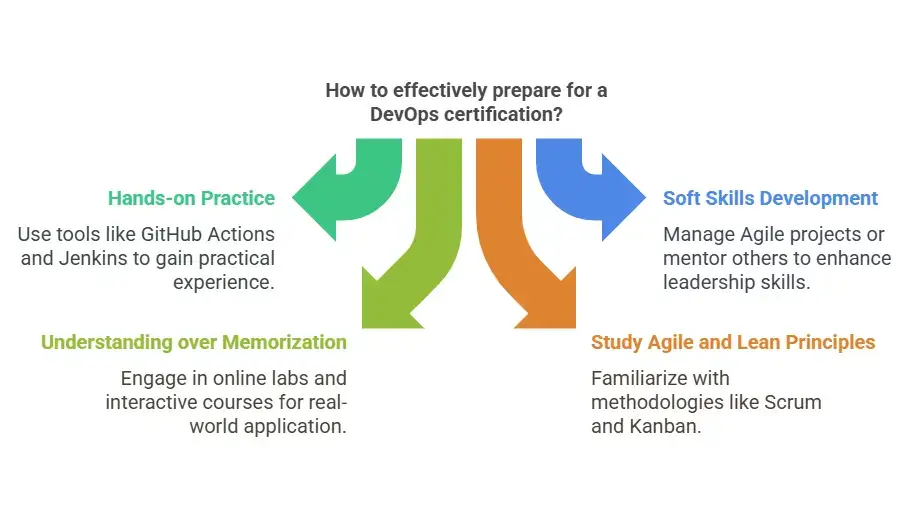
Real-World Applications of DevOps Project Management
DevOps project management isn’t just a buzzword—it’s revolutionizing industries worldwide. Here are three real-world examples of companies successfully implementing DevOps project management:
1. Netflix – Scaling with DevOps
Netflix releases updates thousands of times per day to its streaming platform, ensuring seamless user experience. Their DevOps approach relies on:
- Automated testing and deployment pipelines
- Microservices architecture
- Self-healing infrastructure
✅ Impact: Reduced system failures, enabling 24/7 service availability.
2. Amazon – Faster Deployment, Higher Efficiency
Amazon deploys new features and updates to its cloud and e-commerce platforms every 11.7 seconds using:
- Continuous integration and delivery (CI/CD)
- AI-driven DevOps monitoring
- Scalable cloud infrastructure
✅ Impact: Improved website uptime, seamless checkout processes, and enhanced customer experience.
3. Spotify – Agile Squads for Seamless Releases
Spotify divides its teams into Agile "squads," allowing decentralized decision-making and rapid feature releases.
✅ Impact: Faster innovation cycles, better team collaboration, and a more dynamic product development environment.
🔎 Takeaway: DevOps project management allows companies to move faster, reduce failures, and improve customer satisfaction.
10 Lesser-Known Facts About DevOps Project Management Certification
95% of DevOps failures happen due to poor collaboration, making certified PMs crucial. instinctools.com
Companies using DevOps deploy code 200 times faster than non-DevOps firms. CloudZero
DevOps-certified professionals reduce downtime by 50%. hutte.io
The U.S., Canada, and Germany have the highest demand for DevOps PMs. brokee.io
DevOps methodologies save companies millions annually.
A DevOps PM needs knowledge of automation tools like Jenkins and Docker. StrongDM
Cloud DevOps PMs are in higher demand than traditional PMs.
70% of IT firms require a DevOps certification for senior roles.
DevOps certifications are now included in IT degree programs. markwideresearch.com
DevOps PM roles are growing 40% faster than other IT management positions. statista.com
These facts highlight the significant impact and growing importance of DevOps Project Management Certification in the current IT landscape.
If you're considering job prospects after earning your certification, explore jobs with project management certification to see what roles are available.
The Future of DevOps Project Management – Trends to Watch
As technology evolves, DevOps project management is expected to undergo significant transformations. Here are some emerging trends:
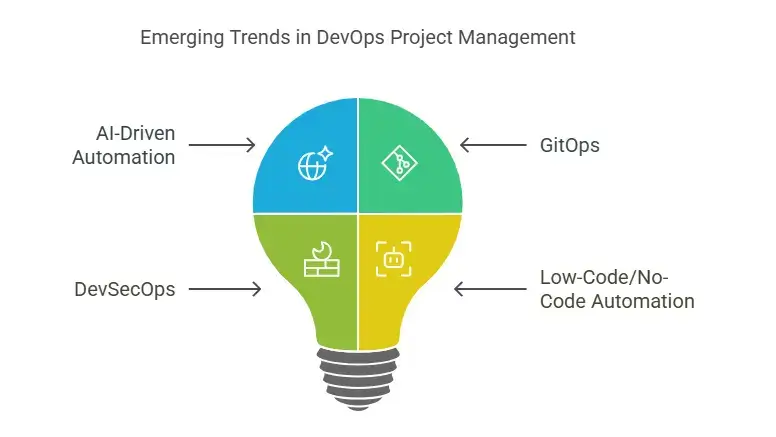
1. AI-Driven Automation in DevOps
AI and machine learning are being integrated into DevOps workflows to optimize:
- Predictive analytics for identifying potential system failures
- Automated debugging to fix issues before they escalate
- AI-powered CI/CD pipelines to speed up deployments
2. Rise of GitOps for Infrastructure Management
GitOps is revolutionizing how organizations manage infrastructure using version-controlled repositories like Git. Benefits include:
- Better traceability for infrastructure changes
- Enhanced security through policy-driven automation
- Improved efficiency in managing cloud environments
3. DevSecOps – Security at Every Stage
Security is no longer an afterthought in DevOps. DevSecOps integrates security checks into every phase of development:
- Automated security testing
- Compliance as code
- Continuous vulnerability scanning
🔎 Why It Matters: Companies that adopt DevSecOps experience 60% fewer security breaches compared to those that don’t.
4. Low-Code/No-Code Automation in DevOps
Low-code and no-code platforms allow non-technical professionals to automate DevOps workflows. This trend will:
- Reduce reliance on complex scripting
- Enable business teams to contribute to automation
- Speed up digital transformation across industries
🚀 Looking Ahead: DevOps project managers who stay ahead of these trends will remain in high demand across industries.
Final Thoughts – Should You Get a DevOps Project Management Certification?
Still undecided? Compare the best project management certifications for your career in 2025 to find the right fit.
If you’re serious about a career in DevOps project management, getting certified is a must. While PMP and Agile certifications provide solid foundations, the APMIC Certification is the most comprehensive program for professionals looking to master both technical and leadership skills.
🚀 Ready to become a top DevOps project manager? Start your certification journey today!
People Also Ask (PAA) – Answering Common Questions
Q1. Is a DevOps project management certification worth it?
Absolutely! Certified professionals earn 30% more and have better job prospects.
Q2. What’s the best certification for beginners?
The APMIC DevOps Certification provides comprehensive beginner-to-expert training.
Q3. How long does it take to complete a DevOps certification?
Most certifications take 3-6 months, depending on your pace.
Q4. Do I need a coding background for DevOps PM?
While coding helps, PM roles focus more on workflows, automation, and team collaboration.
Q5. What industries need DevOps project managers?
IT, finance, healthcare, cybersecurity, e-commerce, and telecom are top industries.
Q6. Does certification guarantee a job?
No certification guarantees a job, but certified professionals are 40% more likely to get hired.
Q7. What skills do I need for DevOps project management?
Agile, Scrum, CI/CD, automation tools, IaC, cloud technologies, and leadership.
Q8. What’s the future of DevOps?
DevOps is projected to dominate IT workflows, with more AI-driven automation in 2025.
Access a DevOps Handbook – A comprehensive guide to DevOps best practices, automation, and workflows.



